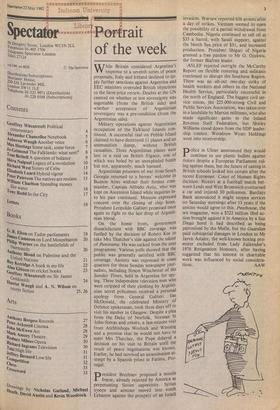Porirait of the week
While Britain considered Argentina's response to a seventh series of peace proposals, Italy and Ireland declined to ap-
ply further sanctions against Argentina and EEC ministers overruled British objections to the farm price review. Doubts at the UN centred on whether or not sovereignty was negotiable (from the British side) and
whether - acceptance of Argentinian sovereignty was a pre-condition (from the Argentinian side).
Military operations against Argentinian occupation of the Falkland Islands con- tinued. A successful raid on Pebble Island claimed to have destroyed 11 planes and an ammunition dump, without British casualties. Three Argentinian planes were lost in a raid on British frigates, one of which was holed by an unexploded bomb but not, apparently, much harmed.
Argentinian prisoners of war from South Georgia returned to a heroes' welcome in Buenos Aires without their former com- mander, Captain Alfredo Astiz, who was kept on Ascension Island while inquiries in- to his past continued. Moscow expressed concern over the closing of ship lanes. President Leopoldo Galtieri promised once again to fight to the last drop of Argenti- nian blood.
On the home front, government dissatisfaction with BBC coverage was fuelled by the decision of Robert Kee to take Mrs Thatcher's side against the editor of Panorama. He was sacked from the next programme. Various polls showed that the public was generally satisfied with BBC coverage. Anxiety was expressed in some quarters for three Sunday newspaper jour- nalists, including Simon Winchester of the Sunday Times, held in Argentina for spy- ing. Three independent television men who were stripped of their clothing by Argenti- nian secret policemen received a personal apology from General Galtieri. Ian McDonald, the celebrated Ministry of Defence spokesman, took three days off to visit his mpther in Glasgow. Despite a plea from the Duke of Norfolk, Norman St John-Stevas and others, a last-minute visit from Archbishops Worlock and Winning and a promise that he would not have to meet Mrs Thatcher, the Pope delayed a decision on his visit to Britain until the result of peace negotiations was known. Earlier, he had survived an assassination at- tempt by a Spanish priest in Fatima, Por- tugal.
President Brezhnev proposed a missile freeze, already rejected by America as perpetuating Soviet superiority. Syrian troops and armour moved into south Lebanon against the prospect of an Israeli
invasion. Warsaw reported 636 arrests after a day of strikes. Vietnam seemed to open the possibility of a partial withdrawal from Cambodia. Nigeria continued to sell oil at $35 a barrel, with Saudi support, against the North Sea price of $31, and increased production. President Shigari of Nigeria granted a free pardon to Mr 0. Ojukwu, the former Biafran leader.
ASLEF rejected outright the McCarthy Report on flexible rostering and militants continued to disrupt the Southern Region. There was an all-out one-day strike of health workers and others in the National Health Service, particularly successful in the north of England. The biggest civil ser- vice union, the 225-000-strong Civil and Public Services Association, was taken over in a landslide by Marxist militants, who also made significant gains in the Inland Revenue Staff Federation, but Shirley Williams stood down from the SDP leader- ship contest. Woodrow Wyatt Holdings went into receivership.
Pin Ulster announced they would 1 continue to use plastic bullets against rioters despite a European Parliament rul- ing against them, but the future of caning in British schools looked less certain after the recent European Court of Human Rights decision. Rioters at a football match bet- ween Leeds and West Bromwich overturned a car and injured 30 policemen. Barclays Bank announced it might reopen services on Saturday mornings after 13 years if the unions would agree to this. Penthouse, the sex magazine, won a $522 million libel ac- tion brought against it in America by a San Diego hotel it had described as being patronised by the Mafia, but the Guardian paid substantial damages in London to Mr Jarvis Astaire, the well-known boxing pro- moter excluded from Lady Falkender's 1976 Resignation Honours, after having suggested that his interest in charitable work was influenced by social considera-






































 Previous page
Previous page